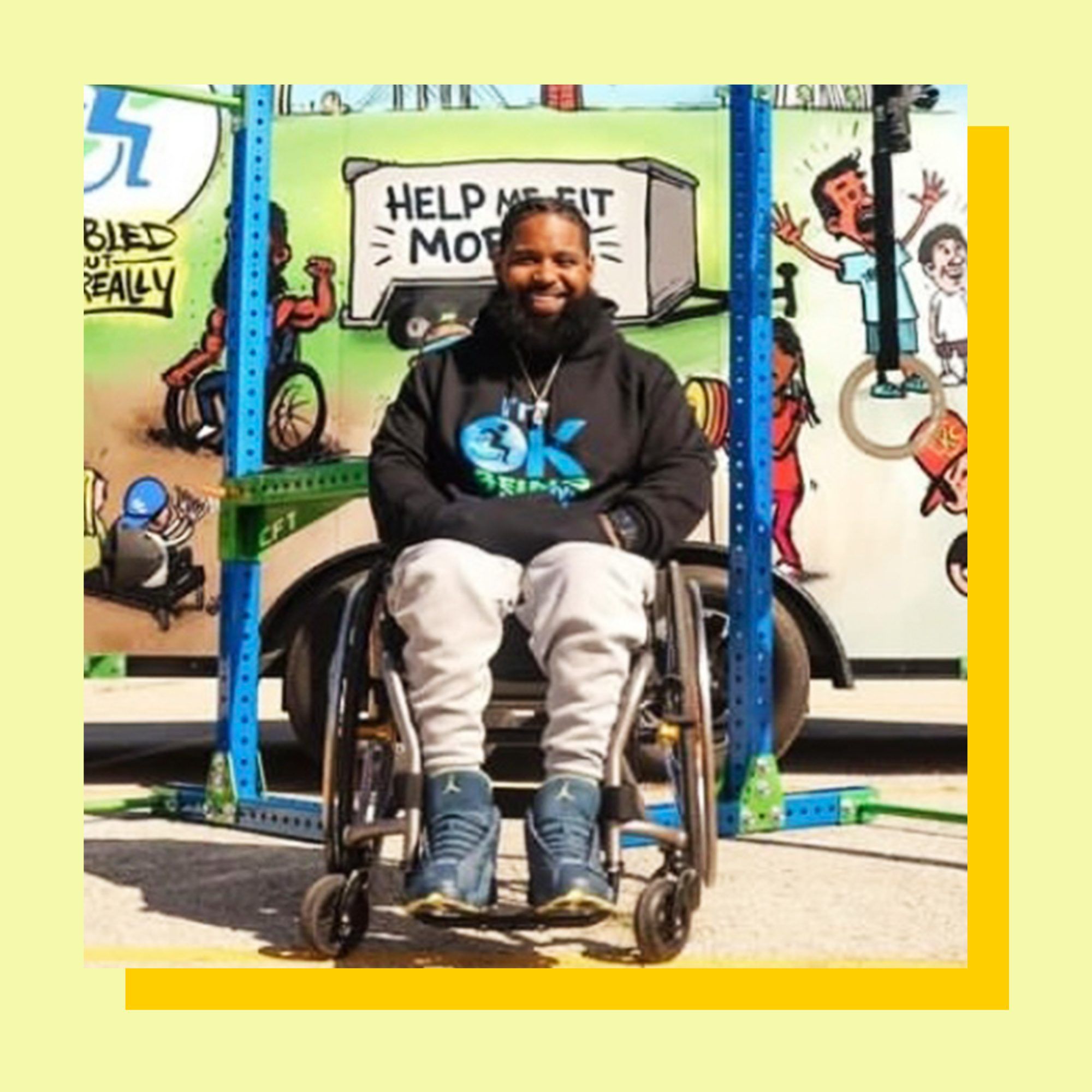Wesley Hamilton never practiced wellness or physical fitness for the majority of his life. He tells Shape that although the neighborhoods in Kansas City, Missouri where he grew up didn’t promote healthy living, he was content with the way he looked despite thinking he was “overweight” for his 5-foot-5-inch body.
Hamilton, then 24 years old, was compelled to reconsider his casual approach to wellness in 2012: Hamilton says he was shot numerous times in January of that year and suffered a spinal cord damage, rendering him immobile from the waist down. He underwent a number of surgeries due to health issues brought on by his injuries and weight, and for the next two years, he was required to spend 21 hours a day in bed, according to him. Hamilton, who has exclusive custody of his then-toddler-aged daughter, claims that he was unable to be a father due to his health issues and bed rest. “I developed the idea that I had to do whatever it took to improve myself,” the author says.
He has to improve his understanding of nutrition as a start. Hamilton says he took a dietetics course at a nearby community college where he learned that food may serve as medicine during the three hours he was permitted to leave his house each day. He began using his knowledge of nutrition to make better food decisions, increasing his intake of fruits, vegetables, and meals that made him feel physically well. Hamilton’s doctors informed him that he had shed over 100 pounds by January 2015. His longstanding “debilitating mindset” that had prevented him from focusing on his physical and emotional well-being abruptly disappeared, according to him. According to Hamilton, “I often say I was mentally disabled before I was physically disabled because I accepted what life was and that thinking fostered a degree of negativity and hate around me. “Once I started feeling better, I didn’t mind using a wheelchair. I loved, trusted, and felt good about myself.”
In just a few weeks, Hamilton established Disabled But Not Really , a 501(c)3 organization with headquarters in Kansas City that offers fitness, nutrition, and mental health programs to help people with disabilities take control of their disabilities and define their own identities. Hamilton himself had lately started informally working out in nearby gyms and had recently picked up some understanding about nutrition, but it wasn’t until the following January that he was thrust into the world of adaptive fitness. He was introduced to adaptive CrossFit online and in person after meeting wheelchair bodybuilders. Just two months later, according to Hamilton, he was competing in back-to-back competitions for both sports. “It really simply did something for me,” he claims, “once I started to be able to take control of my own self and go against the odds of so many.” When people think of disabilities, “I’m truly changing the perception and the paradigm,” I was like.
WESLEY HAMILTON, FOUNDER OF DISABLED BUT NOT REALLY I’m actually altering people’s perceptions of disability and their mental models of it.
creator of crippled but not really, Wesley Hamilton And the tremendous sense of community in those activities only helped him. Hamilton claims that during the course of his three-year career as a professional adapted athlete, he encountered people with a variety of obstacles and talents, including some who were missing limbs, those who had cerebral palsy or multiple sclerosis, and yet they were all athletes. He asks, “You think I’m going to make excuses if I see a guy climbing rope with no legs?” “There is a distinct level of mental strength you have to deal with from that perspective, getting up every day, even though I have my legs and they don’t move. That mental tenacity and the capacity to build your own world in spite of your physical limitations are things I took away from the community. That could only be obtained from that neighborhood.”
Hamilton wanted Disabled But Not Really to be that welcoming, energizing community, which is why in 2018, the group introduced the #HelpMeFit challenge . athletes with disabilities take part in one-on-one training sessions, small-group workouts, group fitness classes at a nearby gym, nutrition seminars, and mental health and gratitude check-ins during the eight-week program, according to Hamilton. The #HelpMeFit challenge is designed to simply help people fit in with who they are, he says. The majority of it is based on identification, and we target the person’s emotional, physical, and general welfare.
The athletes then participate in a professional photo session and video interview after the two months are up, giving them the chance to tell the world who they want to be remembered as, according to Hamilton. That’s where the concept of “help me fit” truly comes into play, he says. “All of these “activities” assisted you in becoming who you are and fitting into your authentic self. You now have the chance to reveal your genuine personality to the world rather than the person that everyone else assumes you to be.”
According to Hamilton, the mental transformation in these athletes has been absolutely stunning. People who develop infirmities later in life frequently struggle to adjust to their new way of life, but the #HelpMeFit challenge has reportedly helped these people come out of their shells. “You can observe folks finding a method to accept throughout these eight weeks. Once they do, they build an identity around it that enables them to be confident in who they are “He claims. By the end of the program, students are eager and motivated to take on more responsibility.
In particular, he claims that trying out fresh fitness challenges enables individuals to advance. For instance, Hamilton recalls an athlete who had been using a wheelchair for 15 years wanting to do pull-ups but lacked the confidence to attempt it alone. He recalls that when he finally gave it a try throughout the training, he completed roughly 30 reps without tiring. He continues, “Anyone can achieve a goal they didn’t thought they could achieve with the help of fitness. (Related: Meet Zion Clark, the Amazing Athlete Increasing Access to Fitness for People with Injuries and Disabilities)
:max_bytes(150000):strip_icc()/Sweat-Equity-1x1-Embed-3-2000-bed58d4a6b744436a99f285dcd107dc3.jpg)
:max_bytes(150000):strip_icc()/Sweat-Equity-1x1-Embed_2-2000-96cdaccc7e8b4d1594fb5b533e4c9bd0.jpg)
IMAGES: Courtesy IMAGES: Courtesy The #HelpMeFit challenge only occurs around once a year for now in order to give athletes the most individualized attention and celebration, but Hamilton wants to expand the organization’s influence. In an effort to reach out to the community and get more people to enroll in the program, Disabled But Not Really launched a mobile gym the previous year. In order to embrace the #HelpMeFit concept, the organization is currently collaborating with gyms in Los Angeles and, perhaps, other cities around the nation. The objective, according to Hamilton, is to allow persons with disabilities and healthy people to exercise together in the same facilities. To establish the DBNR #HelpMeFit challenge globally, he says, “if we can locate gyms that are eager to be inclusive, we’d come in with the equipment, the resources, and then help with the sign-ups.” “If you follow the approach, you develop self-assured people who are now willing to be a member of your gym community.”
Hamilton isn’t one to let the workload get the best of him, even though expanding the company and, of course, maintaining his own fitness regimen demand some major hustle. I was reborn to do the work I do, I suppose when I look at my life, he says. “I accept responsibility for the errors and deeds that may have put me in this situation, but I don’t blame myself for being there. I believe that’s why I realize life has a time clock. I want to be able to give my utmost every day without being hindered by things that could be physically taxing.”













